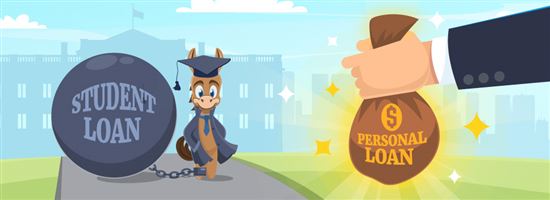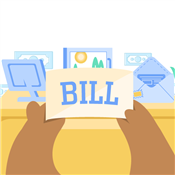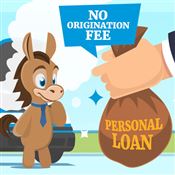Personal Loans for Students
Need extra cash but you're still a student? Personal loans let you borrow money fast and easily. Find out how they work and what your best options are.
 |
Here are the 7 best loans for students:
- SoFi: Best Overall Lender
- Lightstream: Best for Low Interest Rates
- Upgrade: Best for Bad Credit or No Income
- Upstart: Best for Quick Approvals
- LendingPoint: Best for Small Loans
- Achieve: Best for Debt Consolidation
- Universal Credit: Best for Comparing Offers
Education is expensive, but that shouldn't stop anyone from pursuing their studies. Students already have so much on their mind—rent, living expenses, and books.
Fortunately, there are loan options to help you get by without sacrificing too much of your time and resources. If you have nowhere else to turn to financially, borrowing money could be the next best solution for you.
In this guide, learn more about personal loans, the best lenders, and a few financial alternatives.
Borrow $100 to $50,000
- Loans from $100 to $50,000 subject to approval
- If approved, you may get your money in as little as 24 hours
- Online form takes less than 5 minutes to complete
Personal Loans for Students
Banks and lenders let you borrow money through personal loans. They aren't specifically for students, but you can still apply and use the amount to pay for expenses related to your studies.
You can get as little as $1,000 to as high as $100,000 from either online or traditional lenders.
Types of Personal Loans
There are generally two types of personal loans: secured and unsecured.
- Secured Loans
Secured loans require you to put down collateral–which is an asset like a house or a car–in exchange for the loan amount. If you fail to make your payments, the lender can claim your collateral to pay for your borrowed amount. - Unsecured Loans
On the other hand, with unsecured loans, you don't need to put down collateral before you get the money. Instead, lenders approve your application based on how reliable you are with repayments.
Most personal loans are unsecured, which could work better for students who might not have enough assets yet.
Best Personal Loans for Students
You need to pick a lender that suits your needs best—especially if it's the first loan you're ever applying for. Below are the best personal loans for you can apply for if you're still in school.
Borrow $100 to $50,000
- Loans from $100 to $50,000 subject to approval
- If approved, you may get your money in as little as 24 hours
- Online form takes less than 5 minutes to complete
SoFi for the Best Overall Lender
Students with excellent credit looking for a large loan amount can benefit the most from SoFi. They are an online lender that gives you flexible loan terms and doesn't charge origination, late, or prepayment fees.
SoFi also has unemployment protection, which allows you to postpone your payments in case you lose your job during the loan term. Also, they continue to provide support until you can secure employment again.
- $5,000 - $100,000 loan amount[1]
- Low rates
- No fees
- Long loan terms
Lightstream for Low Interest Rates
Lightstream offers a Rate Beat Program for their loans, which guarantees an interest rate that is 0.1% lower than their competitors.[2]
All you have to do is submit your approved loan application with the same amount, purpose, and terms from a different lender. Please note that you can't use a LightStream personal loan to fund college and postsecondary education expenses or refinance education loans.
- $5,000 - $100,000 loan amount
- No fees
- Quick approval
- Strict loan terms
Upgrade for Bad Credit or No Income
Some students have a harder time building credit while pursuing their studies. If that's the case, consider lenders like Upgrade.
Upgrade offers personal loans for those with bad credit and they don't have a minimum income requirement. So, you can still get approval while in between jobs.
- $1,000 - $50,000 loan amount[3]
- Offers direct pay to other creditors
- High APRs and fees
- 2 to 7 years repayment terms
Upstart for Quick Approvals
Upstart uses an AI-based platform to take your education and job history into consideration when you apply. This makes the process easier, faster, and more accommodating towards students.
They also let you choose your payment date to help make sure you can make your repayments.
- $1,000 - $50,000 loan amount[4]
- No prepayment penalties
- Origination and late fees
- 3- and 5-year repayment terms.
LendingPoint for Small Loans
If you have a sudden expense and need the money fast, LendingPoint is a great choice for small loans.
You can apply for a personal loan even with a low credit score, meaning you won't have to borrow more than you need. As a result, you can also avoid getting into too much debt. Also, once approved, you can get your money as soon as the next day.
- $2,000 - $36,500 loan amount[5]
- Quick funding
- No prepayment penalties
- High maximum APR
Achieve for Debt Consolidation
Achieve offers direct payment to creditors to help borrowers pay off their debt with ease. With this feature, you can settle your student loans or credit card bills without having to do it manually.
Unlike other lenders, Achieve has three discount options for their customers: a direct pay discount, a co-borrower discount, and a retirement asset discount. Make sure to check if you qualify for one to get a lower interest rate on your loan.
- $5,000 - $50,000 loan amount[6]
- Multiple discounts
- Quick approval and funding
- Low maximum APR
Universal Credit for Comparing Offers
If you want to compare your options before you apply for a personal loan, Universal Credit can help you find an offer tailored to your needs.
Their lending platform lets you see personal loan details from their partners side-by-side, even ones that have choices for those with bad credit.
- $1,000 - $50,000 loan amount
- No prepayment penalties
- Flexible requirements
- High APRs
Personal Loan Calculator
Taking on a personal loan can be a heavy financial responsibility, especially for students. So, to make sure you don't bite off more than you can chew, use a personal loan calculator.
It will calculate your monthly repayments and your total loan amount with interest to help you determine if the loan would be manageable.
How to Qualify for a Personal Loan
Before you get a loan approval, lenders have to check if you qualify for the loan. The requirements of each may differ, but they will generally look at your credit score, debt, and income.
- Credit Score
Your credit score shows how reliable you are financially by taking into account your previous loans (if any) and if you paid them on time.It is also what helps lenders determine how much they can let you borrow. The higher the credit score, the better your chances are at getting a high loan amount.
What's your credit score?However, your credit score isn't only important before your loan application. You must remember that your diligence during the term will also influence your credit score, therefore affecting any of your future loan applications. Just make sure to pay your dues on time so your score won't decrease.
If you want to check your credit score, consult your bank or credit card company. They usually give out a free credit score report. But the easiest and quickest way is to visit AnnualCreditReport.com to access your credit report for free once a year. - Debt
Any current debt of yours can also affect your loan application. If you are making other repayments, adding a personal loan to your list might not be practical for both you and the lender.Settle all your debts before applying for a personal loan to have a better chance of getting approval.
- Income
Most lenders require a certain minimum income before your loan can be approved.How much you earn monthly and if your income source is stable let them know if the loan amount and terms you apply for are doable.
Don't worry if you haven't built a credit score or have no stable source of income. You can still get a secured personal loan or find a lender that allows bad credit or delayed income.
Getting a Cosigner for a Personal Loan
Some students might not have had the chance to build a good credit score yet, which makes it more difficult for them to qualify for a loan. Additionally, taking one on can be quite weighty to handle alone.
If you think your application isn't strong enough to get approval, you could consider getting a cosigner.
A cosigner is basically your partner in taking on the loan. Since they equally share the responsibility with you, they are required to make the repayments if you are unable to.
Applying for a personal loan with a cosigner will not only help you get approval, but it could also grant you better loan conditions or qualify you for a higher amount.
Things to Look for in a Personal Loan
It's important that you know what makes up a loan offer to determine if it would be reasonable and within your budget. Here's what you should look out for:
- Fees
Before and during your loan, you could be charged for a few services, depending on the lender.At the very least, make sure you are aware and able to pay for the additional fees of your loan.
If you're not careful, you could get stuck in an unhealthy repayment cycle where you are charged more than you originally planned.
Common fees to consider when taking out a personal loan:- Origination fees — upfront costs for making the loan
- Prepayment penalties — penalty charges for paying your loans early
- Late payment fees — charges for payments past the due date
- Origination fees — upfront costs for making the loan
- Interest Rates
Lenders take a percentage of your loan amount and add it to your monthly repayments. Interest rates let you know the final total of your loan and how much your installments are.Always factor in the interest rates of your loan. It might not seem like much at first, but they can drastically change the overall sum you have to pay. Make sure the monthly installments and the total are within your budget.
- Loan Term
A loan term is how long you will be making the repayments. It can range from 1 - 7 years, and you'll have to pay a fixed amount monthly until you pay it off in full.A longer term would mean smaller monthly payments, but this could also lead to a higher total since you'll be incurring more interest. But, do choose whatever arrangement is best for you.
Borrow $100 to $50,000
- Loans from $100 to $50,000 subject to approval
- If approved, you may get your money in as little as 24 hours
- Online form takes less than 5 minutes to complete
Personal Loan Alternatives for Students
Sometimes, lenders don't approve you for a personal loan. Here are some alternatives you can try.
- Student Loans
Unless you need the money for expenses outside of your school needs, a student loan is another option you could consider. Some lenders don't let you use your personal loan to pay for a college education, so be sure to get the correct loan for your needs.- Federal Student Loans
Federal student loans are the more popular choice when it comes to student loans. Since they are given by the government, they have lower fixed interest rates, easier requirements, and repayment settings that are more favorable toward your financial circumstances. - Private Student Loans
You can also opt for private student loans from lenders, banks, and credit unions. However, borrowing from these financial institutions can be more expensive. Most of them have varying interest rates, stricter requirements, and repayment terms.
- Federal Student Loans
- Scholarships
Scholarships are an excellent way to exclusively fund your education without incurring any debt.They do, however, have a specific set of requirements before you can get one, but they are often diverse enough to accommodate all kinds of students.
There are scholarships for student athletes, the academically gifted, special programs, those who qualify for financial assistance, and many more. Consult your school officials to see if you are eligible for one.
Keep in mind that to keep such scholarships, you might need to maintain a certain GPA or other conditions. Otherwise, you could be disqualified and then you'd have to continue paying tuition.
- Grants
Grants are also a source of financial aid to help students further their studies. While they are similar to scholarships, they are more focused on those who need the money rather than those with exceptional skills and talent.Check in with your school, local government office, or any private institution with grant offers. Your financial standing might qualify you for one.
- Side Hustle
If you have extra time on your hands, working a part-time job might be a better way to help get your finances back on track. If you don't want to stray too far from your school, consult your institution about job opportunities within the campus.Don't forget to consider online job opportunities as well. Nowadays, there are so many digital ways to make money. The remote setup might make it easier to work while studying, too. - Work-study Programs
For a side-hustle setup that is more geared towards students, a work-study program could be a beneficial loan alternative.Work-study programs have more favorable work conditions for students. You can earn the federal minimum wage or more depending on where you are assigned.
They guarantee a once-a-month income, fixed work hours, and direct payment to your bank account. You will be responsible for paying your tuition and other school fees.
You could also be given job opportunities that are close to your field as advised by the Department of Education.
Work-study programs have a first come, first served basis when it comes to funding. The earlier you apply, the better. - Sponsorships
Some companies and institutions offer sponsorships that pay for tuition fees and other miscellaneous expenses. If you are currently employed, you can ask your HR department if there are any available for you.You can get scholarships or tuition reimbursement with these sponsorship programs.
With tuition reimbursement, you have to pay your fees yourself and submit proof to your employer to have them reimburse the amount to you.
- Credit Cards
As a student, building credit might be the last thing on your mind. But, do consider getting a student credit card if you need extra money for personal and living expenses instead of a loan.It'll let you build a strong credit profile that is going to help you way past your schooling once you get into the real world.
- Family and Friends
If taking out a loan is a bit heavy for you, try reaching out to loved ones who can let you borrow some money. You can negotiate the terms to make sure you can make your repayments. Since this is not a formal way to lend cash, have the agreement in writing for accountability. - Crowdfunding
When all else fails, you could always take a risk and count on the kindness of others. Crowdfunding lets you ask people for support and donations to help fund your studies.You can start a fundraiser or create a profile on GoFundMe.com to get started. Remember that it's important to get the word around, so make sure your cause has a wide reach to achieve your goal faster.
FAQs
Can I Get a Personal Loan as a Student?
Yes. Lenders will mainly look at your credit score, debt, and income when evaluating your loan application–not your status as a student.
However, if you have a special case and can't secure a stable income or acceptable credit score, there are other financial fixes you can consider such as a student loan, a part-time job, credit cards, and borrowing money from loved ones.
What Are the Risks of Getting a Personal Loan?
A personal loan can be beneficial when used properly, but can also come with the following risks:
- Decrease your credit score
- Significantly add to your debt
- Interest rates and fees can make your total loan unmanageable
- Make you financially unstable
- You could lose your assets if you applied for a secured loan and can't make your repayments
What Can Students Use a Personal Loan For?
Generally, you can use a personal loan amount to pay for anything that is approved by the lender. Some examples are living and personal expenses, bills, emergencies, and debt consolidation.
So, check what loan purposes are acceptable to a provider before applying to make sure you can use the funds for the right reason.
Should I Get a Personal Loan or a Student Loan?
Get a personal loan for expenses that are not specifically tied to your education, such as groceries, bills, and paying off debt. Otherwise, go for a student loan if you want to use the money specifically for funding your tuition and school needs.
How to Tell if The Loan Is a Scam?
Unfortunately, there are many predators who prey on naive students with their financial scams. To make sure you don't fall victim to one of their traps, here are a few things to look out for:
- There's pressure
A legitimate lender won't force you to make upfront payments or sign an agreement immediately. - There's no transparency
Banks and other financial institutions have to earn the proper credentials before they can start lending money. They also have to be extremely transparent with their business. If you can't find enough information or sources about your lender, there's a high chance that they're scammers. Make sure they are verified as well. - The offers are too good to be true
When a lender lets you borrow money, it's always a risk for them. That's why they are very thorough when it comes to checking your creditworthiness. So, if they are too quick to approve or the offer is out of your league, something might be up.
Bottom Line
Personal loans are just one of the many ways for students to get a quick financial fix. You can use it for bills, groceries, learning materials, and other living expenses. It can even help pay for tuition fees.
But, there are alternative ways for students to get money that are better suited to their needs. For example, a student loan for tuition, a part-time job, a credit card for smaller out-of-school expenses, or even just borrowing from your family and friends.
Make sure to compare lenders and their offers before you apply for a personal loan to get one that is best for your purpose and budget.
References
- ^ SoFi. Personal Loans: What is the minimum and maximum I can borrow?, Retrieved 6/3/2023
- ^ LightStream. Rate Beat Program, Retrieved 6/3/2023
- ^ Upgrade. Personal loans, Retrieved 7/14/23
- ^ Upstart. Personal loans, Retrieved 7/14/23
- ^ Lendingpoint. Personal loans, Retrieved 7/14/23
- ^ Achieve. Loan Amount Retrieved: 7/14/23
Write to Abby Erfe at feedback@creditdonkey.com. Follow us on Twitter and Facebook for our latest posts.
Note: This website is made possible through financial relationships with some of the products and services mentioned on this site. We may receive compensation if you shop through links in our content. You do not have to use our links, but you help support CreditDonkey if you do.
|
|
| ||||||
|
|
|


















